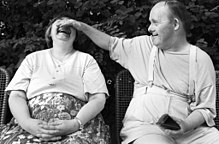
Back معلولیت و کنشهای جنسی Persian Sexualité et handicap French Sexualidade e discapacidade Galician Seks niepełnosprawnych Polish Sexualidade e deficiência Portuguese Инвалидитет и сексуалност Serbian Engellilik ve cinsellik Turkish
This article has multiple issues. Please help improve it or discuss these issues on the talk page. (Learn how and when to remove these messages)
|

| Disability |
|---|
|
|
Sexuality and disability is a topic regarding the sexual behavior and practices of people with disabilities. Like the general population, these individuals exhibit a wide range of sexual desires and adopt diverse methods of expressing their sexuality. It is a widespread concern, however, that many people with disabilities do not receive comprehensive sex education, which could otherwise positively contribute to their sexual lives. This stems from the idea that people with disabilities are asexual in nature and are not sexually active. Although some people with disabilities identify as asexual, generalizing this label to all such individuals is a misconception. Many people with disabilities lack rights and privileges that would enable them to have intimacy and relationships.[1][2] When it comes to sexuality and disability there is a sexual discourse that surrounds it. The intersection of sexuality and disability is often associated with victimization, abuse, and purity, although having a disability does not change someone's sexuality, nor does it change their desire to express it.[3][4]
For physical disabilities that change a person's sexual functioning, such as spinal cord injury, there are methods that assist where needed. An individual with disabilities may enjoy sex with the help of sex toys and physical aids (such as bed modifications), by finding suitable sex positions, or through the services provided by a sex worker.[2]
- ^ Edwards, Coleman, Weston, Eli (June 2004). "Defining Sexual Health: A Descriptive Overview". Archives of Sexual Behavior. 33 (3): 189–95. doi:10.1023/B:ASEB.0000026619.95734.d5. PMID 15129038. S2CID 37198876.
{{cite journal}}: CS1 maint: multiple names: authors list (link) - ^ a b "Sex and disability: Sex after spinal cord injury". 6 February 2009. Retrieved 2009-02-20.
- ^ Services, Department of Health & Human. "Disability and sexuality". www.betterhealth.vic.gov.au. Retrieved 2024-09-17.
- ^ Tepper, Mitchell S. (2000). "Sexuality and Disability: The Missing Discourse of Pleasure". Sexuality and Disability. 18 (4): 283–290. doi:10.1023/A:1005698311392. S2CID 140755132.